Don’t Grow Your Onions Without These Companion Plants Argues Dan Ori

VEGETABLES > ONIONS > COMPANIONS
Reviewed By DAN ORI

Dan has over 27 years’ under his belt caring for plants and gardens. Working as a Horticultural Instructor and Consultant, he draws on a diverse range of experience that includes working as a Head Gardener, Tree Surgeon, Garden Centre Trouble Shooter, and writer of academic papers. Dan has a Level 3 Diploma in Horticulture and is currently a candidate for the RHS’s most prestigious award – The Master of Horticulture.
Contributions From ANN-MARIE POWELL

Ann-Marie is an award-winning Garden Designer who has worked on private, commercial and charity gardens. Her experience includes work on Grade 1 and 2 listed gardens and Gold-Medal winning show gardens at RHS Chelsea. She was recently featured in Sky Arts show ‘Art Of The Garden'. In 2021, Ann-Marie published her first book, ‘My Real Garden’.

Gerald Stratford has been growing his own veg since the age of 4. He is the author of ‘Big Veg’ and is hailed as ‘The King Of Veg’ by his audience - with almost 500,000 keen followers across his various social accounts.
IN THIS GUIDE
- 1) Tomato
- 2) Spearmint
- 3) Common Marigold
- 4) Common Lettuce
- 5) Parsley
- 6) Bell Pepper
- 7) Rose ‘Yellow Meilove’
- 8) Alpine Strawberry
- 9) Borage
- 10) Garden Nasturtium
- 11) Dill
- 12) Carrot
- 13) Bacon Weed
- 14) Melon ‘Emir’
- 15) Spinach
- 16) Summer Savory
- 17) Kale
- 18) African Marigold
- 19) Common Beetroot
- 20) Common Sowthistle
- 21) Chamomile
- 22) Potato
- 23) Mountain Chrysanthemum
- 24) Parsnip
- 25) Ornamental Cabbage
- References
ONION GUIDES
Companion Plants
Harvesting
Preventing Bolting
Sowing
Onions are a popular culinary delight and when grown in your garden, you’ll have the benefit of being able to harvest them whenever you like throughout the summer and autumn months.
Onions have a strong aroma, and this means that they can be a great companion plant for many different crops and other plants in your garden.
They are said to repel or confuse a range of different types of pests.
“Before you get overly excited about the potential benefits of companion planting, it is important to highlight that most companion plants benefits or efficacy have not been subject to much or any peer review studies, so we can’t say with absolute certainty that this plant benefits that plant,” says Dan Ori, Master Horticulturist.
“However, we can say that in this article the companion plants and benefits listed are most likely to be correct based on observations and applied theory.”
Onions can be usefully placed:
- In mixed pots and planters.
- In annual vegetable beds over winter with other overwintering crops.
- Intermixed with other annual crops in kitchen garden beds in summer.
- In rows intercropped between another main crop.
- Around the edges of growing areas as a partial pest barrier.
Perennial types in particular can also be very useful in fruit tree guilds, forest gardens and other perennial planting schemes.

Ideally, annual onions should be part of a crop rotation scheme, so that they are not grown in the same areas over multiple years.
So this should be considered along with companion planting when creating your planting plans.
Due to crop rotation needs, it can be useful to think about growing onions alongside other alliums (such as garlic and leeks, for example).

However, it is important to remember that pests and diseases can pass between them, so it is generally not a good idea to grow only alliums in a particular bed or growing area.
In this guide, we share 25 different plants that make good companions for onions, from herbs to flowers to other vegetables – there is definitely an option for everyone.
1) Tomato

- BOTANICAL NAME: Solanum lycopersicum
- HARDINESS RATING: H1C
- PLANT TYPE: fruit
- FOLIAGE TYPE: deciduous
- FLOWERS: yellow
- FLOWERING SEASON(S): spring / summer
- FRUIT SEASON(S): summer
Tomatoes are a great way to kick off this list.
This deciduous fruit is one of the most popular kitchen staples here in the UK and is used in a range of different recipes and dishes.
It is also frequently grown in gardens thanks to how easy they are to plant and care for once established.
Not only are tomatoes a delight in their own right, but they are also great for planting next to onions, as the smell of your alliums can deter pests that might otherwise help themselves to your tomato plants, such as whitefly and moths.
2) Spearmint

- BOTANICAL NAME: mentha spicata
- HARDINESS RATING: H7
- PLANT TYPE: herb / perennial
- FOLIAGE TYPE: deciduous
- FLOWERS: purple
- FLOWERING SEASON(S): summer
Although mint has a reputation for not always being the best companion plant, it grows well with onions, as its scent can help repel onion flies and aphids that are sometimes attracted to different varieties of allium.
Also, this full hardy herb produces small purple flowers in the summer that are great for attracting pollinators and other beneficial insects.
Just be aware that spearmint can sometimes be considered invasive due to its spreading habit that can reach up to 1.5m wide, but this should not be an issue for your onions once they are established in your vegetable patch.
You can always grow your mint in pots nearby if you’re worried about them spreading.
3) Common Marigold

- BOTANICAL NAME: calendula officinalis
- HARDINESS RATING: H5
- PLANT TYPE: annual / biennial
- FOLIAGE TYPE: deciduous
- FLOWERS: orange
- FLOWERING SEASON(S): summer / autumn
The first flower on this list, common marigolds are hardy annuals that bear stunning orange daisy-like flowers from May until October that will look great next to the fuzzy heads of your onion crops.
Like spearmint, marigolds are great for pollinators and will help draw beneficial insects towards your alliums if planted close together.
Marigolds are also loved by slugs, which you might think is a bad thing, but in reality, these slimy creatures will be too busy munching on their leaves to even notice your alliums.
4) Common Lettuce

- BOTANICAL NAME: lactuca sativa
- HARDINESS RATING: H2
- PLANT TYPE: vegetable
- FOLIAGE TYPE: deciduous
- FLOWERS: yellow
- FLOWERING SEASON(S): summer
Onions don’t take up much room in a vegetable patch, which is one of the reasons why they are so popular with UK home growers.
If space is a key factor in your decision-making, lettuce might just be the ideal choice for you.
Like allium, lettuce takes up most of its space underground, meaning it can be planted close to other root crops to utilise space and make more room for other plants you might wish to grow.
This vegetable is relatively easy to grow, just make sure it receives plenty of sunshine throughout the day, as lettuce thrives in sun.
5) Parsley
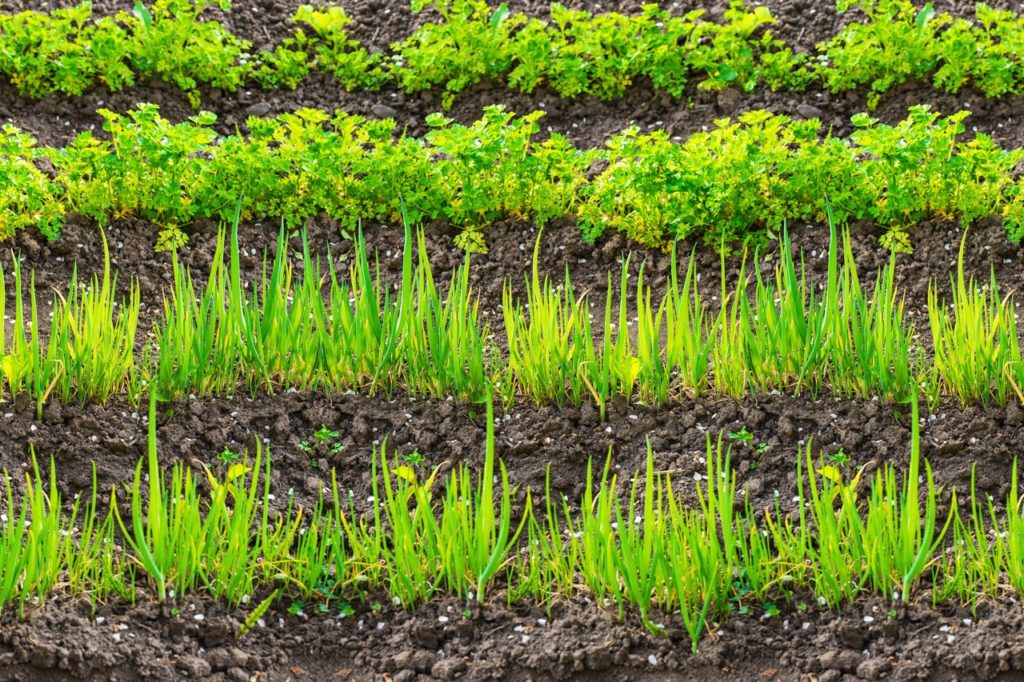
- BOTANICAL NAME: petroselinum crispum
- HARDINESS RATING: H6
- PLANT TYPE: biennial / herb
- FOLIAGE TYPE: semi-evergreen
- FLOWERS: green and yellow
- FLOWERING SEASON(S): summer
Onion flies are notorious pests that feast on alliums such as onions and garlic and can cause severe damage to these crops.1Onion Maggot. (2016, October). Center for Agriculture, Food, and the Environment. Retrieved March 21, 2023, from https://ag.umass.edu/vegetable/fact-sheets/onion-maggot
Luckily, parsley is a fragrant herb that, if planted next to your onions, can deter these flies and keep them away from your vegetable patches.
Parsley is a small biennial that grows well in most conditions and will also provide you with aromatic foliage that can be harvested and used in your kitchen.
6) Bell Pepper

- BOTANICAL NAME: capsicum annuum
- HARDINESS RATING: H1C
- PLANT TYPE: fruit
- FOLIAGE TYPE: deciduous
- FLOWERS: white
- FLOWERING SEASON(S): summer
- FRUIT SEASON(S): summer / early autumn
Aphids are another pesky pest that can feed on your crops and the bell pepper is one of its favourites.
As mentioned previously, onions are good at deterring some insects like aphids, so can be planted around your bell peppers to act as a barrier of protection.
This frost-tender fruit produces delicious yields and can grow well in similar conditions to onions, making it suitable for companion planting.
Be wary that this plant will struggle to survive once colder temperatures start to move in over autumn.
7) Rose ‘Yellow Meilove’

- BOTANICAL NAME: rosa ‘yellow meilove’
- HARDINESS RATING: H7
- PLANT TYPE: shrub
- FOLIAGE TYPE: deciduous
- FLOWERS: yellow
- FLOWERING SEASON(S): summer / autumn
You won’t find a garden flower that loves being planted next to onions as much as the garden rose.
As well as deterring pests that can often affect the flowers of a rose plant, onions are also said to improve the aroma of their beautiful blooms and have been planted next to roses for this reason for years.2Garlic Guide. (n.d.). An Herb Society of America Guide. Retrieved March 21, 2023, from https://www.herbsociety.org/file_download/inline/f751abad-cc5c-414f-89a5-b9e6b012ea70
I’ve highlighted one of my favourite varieties ‘yellow meilove’ here, but there are lots of unfussy, fully hardy roses for you to choose from that will grow well with onions.
8) Alpine Strawberry

- BOTANICAL NAME: fragaria vesca
- HARDINESS RATING: H6
- PLANT TYPE: perennial / fruit
- FOLIAGE TYPE: semi-evergreen
- FLOWERS: white
- FLOWERING SEASON(S): spring
- FRUIT SEASON(S): summer
Strawberries are another popular fruit to grow with your onions, as they both thrive in the same conditions and will grow well together in a sheltered position in full sun.
In fact, strawberry plants can help provide some shade for your onion’s roots, which like to be kept cool, and in return, your onions can deter fruit-loving pests from going near your berries.
Alpine strawberries are a smaller variety and are great for cultivating in pots with some onions if you wish.
9) Borage
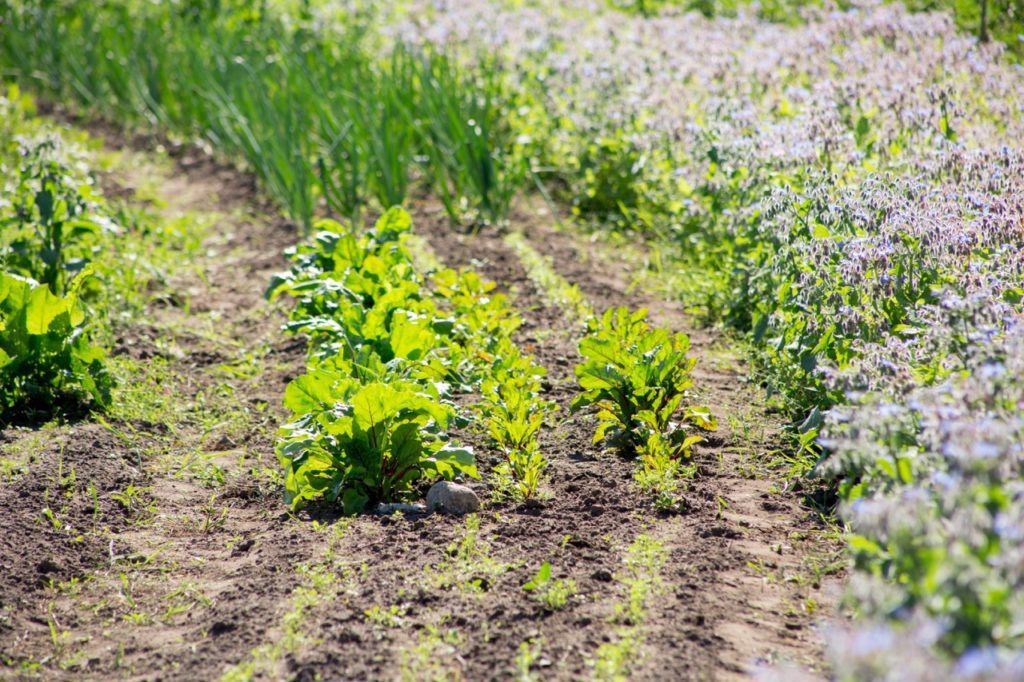
- BOTANICAL NAME: borago officinalis
- HARDINESS RATING: H5
- PLANT TYPE: annual
- FOLIAGE TYPE: deciduous
- FLOWERS: blue
- FLOWERING SEASON(S): summer / autumn
A hardy plant that will keep onion flies away from your onions, borage is a wonderful companion plant for alliums.
Its blue flowers that grow in clusters on long stems in the summer and autumn months look great amongst the tall, fluffy heads of onion plants and will both create a great display throughout the warmer months of the year.
Borage is also a great plant to grow in your garden regardless of its ornamental benefits, as you can use the leaves to make organic fertilisers that can assist in your vegetable’s growth when applied.
10) Garden Nasturtium
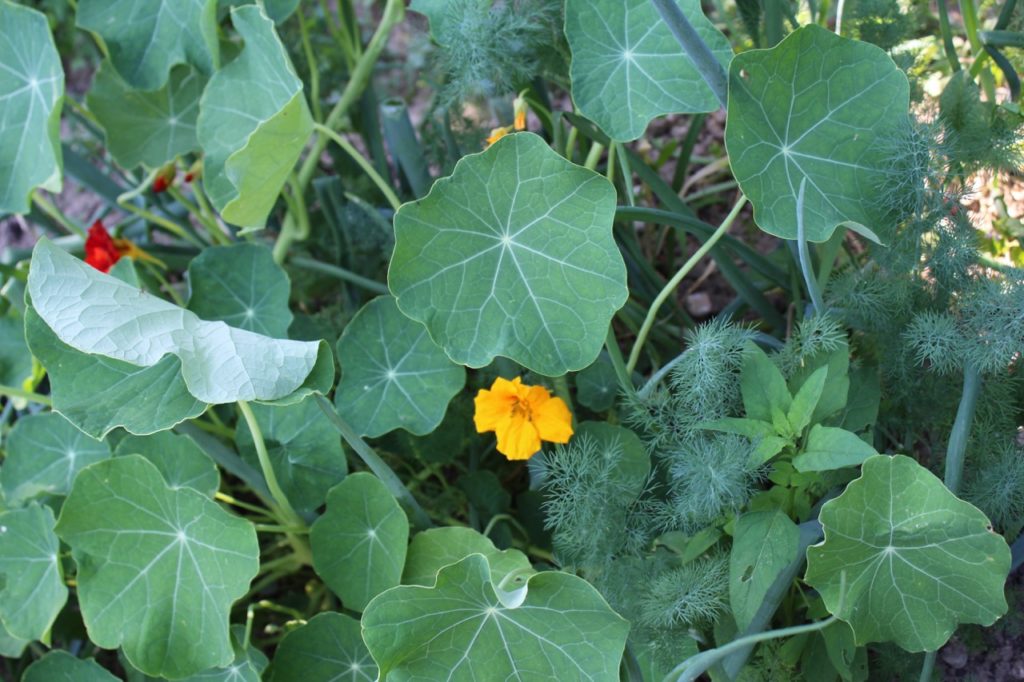
- BOTANICAL NAME: tropaeolum majus
- HARDINESS RATING: H3
- PLANT TYPE: climber / annual / shrub
- FOLIAGE TYPE: deciduous
- FLOWERS: yellow, red and orange
- FLOWERING SEASON(S): summer / autumn
Nasturtiums are a great companion plant for many vegetables as they are brilliant at attracting aphids and other potential pests – keeping them from your prized crops.
They can also be used as a trap plant in a vegetable patch, encouraging slugs and snails to munch on their foliage rather than that of your onions and other crops.
A frost-tender annual, this shrub is easy to grow and will flower throughout the summer and autumn, providing some fiery colour wherever it is planted.
11) Dill

- BOTANICAL NAME: anethum graveolens
- HARDINESS RATING: H4
- PLANT TYPE: annual / herb
- FOLIAGE TYPE: deciduous
- FLOWERS: yellow
- FLOWERING SEASON(S): summer
Anethum graveolens, more commonly known as dill, is an annual herb that enjoys the benefits that being planted next to onions can bring, as it can attract aphids and other bugs which onions are great at getting rid of.
However, dill can also help onions in return by means of pest control, as they are particularly good at fighting off red spider mites which can often plague alliums growing in the garden.
Dill is also a wonderful herb, most often used in Mediterranean dishes, and can be harvested in spring and summertime for use in your kitchen.3Cornish, R. (2022, September 20). Dill: Everything you need to know. Good Food. Retrieved March 21, 2023, from https://www.smh.com.au/goodfood/everything-you-wanted-to-know-about-dill-20220908-h268tf.html
“Dill is a really nice plant,” says Garden Designer Ann-Marie Powell.
“I love plants that grow so quickly you can almost see them growing in front of your eyes.
“They sort of explode into these starry flowers that get caught in the wind so you can see them move as well.”
12) Carrot

- BOTANICAL NAME: daucus carota subsp. sativus
- HARDINESS RATING: H7
- PLANT TYPE: vegetable
- FOLIAGE TYPE: deciduous
One of my favourite vegetables to grow each year, carrots are fully hardy vegetables that are easy to cultivate, fun to harvest and a delight when eaten raw or cooked.
Onions and carrots are a particularly effective combination, since the onions will not only help the carrots (by repelling or confusing carrot fly) – the carrots are also said to keep onion flies away.
If planting together, just make sure both plants have enough space to grow underground freely so they can reach a desirable size.
13) Bacon Weed

- BOTANICAL NAME: chenopodium album
- HARDINESS RATING: H7
- PLANT TYPE: annual
- FOLIAGE TYPE: deciduous
- FLOWERS: green
- FLOWERING SEASON(S): summer / autumn
You might be wondering why I’ve selected a weed as one of my picks on this list, but hear me out.
Although I wouldn’t recommend planting bacon weed from seed, as it is a prolific self-seeder as it is, if this weed is growing in your vegetable patch near your onions, there is no need to panic.
In fact, bacon weed, also known as common goosefoot, can actually help to enrich the soil where alliums grow – provided its spread is kept under control.
Bacon weed can even be harvested and eaten and is often used as a substitute for lettuce for those who don’t want to waste this weed.
So next time you spot this weed growing near your onions, maybe think twice before getting rid of it completely.
14) Melon ‘Emir’
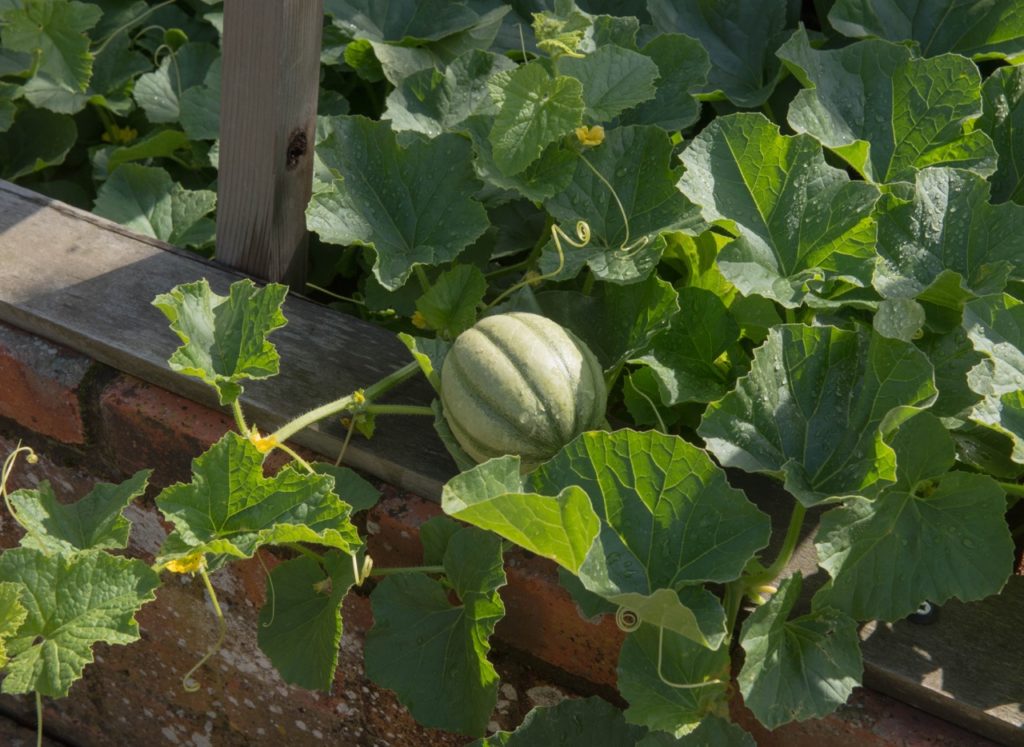
- BOTANICAL NAME: cucumis melo ’emir’
- HARDINESS RATING: H1C
- PLANT TYPE: fruit / annual
- FOLIAGE TYPE: deciduous
- FRUIT SEASON(S): summer
Melons are fruit-bearing annuals that adore onions for their fragrant aroma that helps to deter pests from their fruits.
For the purpose of this list, I’ve chosen the cultivar ’emir’, which is a tasty cantaloupe cultivar that is actually best grown under some cover, like a cloche, polytunnel or in a heated greenhouse.
They grow best in as much sunshine as possible, and onions are great for planting by their side as they are unlikely to get in the way of the warm rays this fruit needs to grow.
15) Spinach

- BOTANICAL NAME: spinacia oleracea
- HARDINESS RATING: H4
- PLANT TYPE: vegetable
- FOLIAGE TYPE: deciduous
As we have established, onions are a popular companion plant because their strong scent can help to fend off pests that might pose a problem for other fruit and vegetables – spinach being another of the plants that benefit.
However, alliums are also great at bringing pollinators like ladybirds to your garden – beneficial garden predators that might feast on any pests that manage to work their way into your crops.
Spinach is often plagued by pests, so planting onions, which also thrive in the same growing conditions as this leafy vegetable, is a great way to naturally repel any harmful bugs.
16) Summer Savory
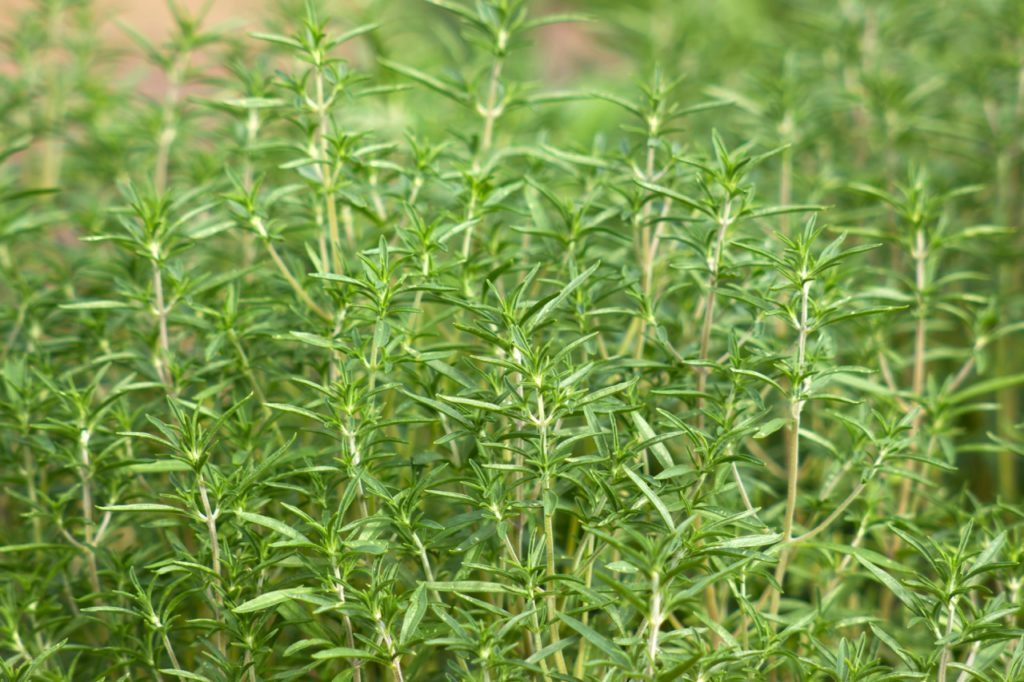
- BOTANICAL NAME: satureja hortensis
- HARDINESS RATING: H4
- PLANT TYPE: annual / herb
- FOLIAGE TYPE: deciduous
- FLOWERS: white
- FLOWERING SEASON(S): summer
Planting summer savory near your onions is said to improve the taste of your crop by making them sweeter, so, if the taste is your priority, why not try planting this herb?4Tirrell, R. (1971, March 7). Summer Savory. The New York Times. Retrieved March 21, 2023, from https://Cornish, R. (2022, September 20). Dill: Everything you need to know. Good Food. Retrieved March 21, 2023, from https://www.smh.com.au/goodfood/everything-you-wanted-to-know-about-dill-20220908-h268tf.html
Grown as an annual, summer savoury has its own culinary uses and is a popular substitute for salt and pepper or for use in a marinade or meat rub.5Blue, N. (2023, January 30). What Is Savory: All About the Savory Herb and 4 Related Recipes. Recipes.net. Retrieved March 21, 2023, from https://recipes.net/articles/what-is-savory-herb-and-related-recipes/
This small herb needs a site in full sun but is otherwise unfussy and also produces dainty white flowers during the summer that will add some colour to your vegetable beds.
17) Kale

- BOTANICAL NAME: brassica oleracea
- HARDINESS RATING: H7
- PLANT TYPE: vegetable
- FOLIAGE TYPE: evergreen
- FLOWERS: yellow
- FLOWERING SEASON(S): summer / autumn
Kale is a versatile vegetable and can be used in smoothies, salads and other culinary dishes – its luscious leaves can be harvested all year round.6Kale. (2021, October 19). The Nutrition Source. Retrieved March 21, 2023, from https://www.hsph.harvard.edu/nutritionsource/food-features/kale/
However, as a brassica, it is vulnerable to many pests such as caterpillars and aphids, which is why kale can benefit from the pungent scent of onions that can repel these hungry bugs.
Just be aware that this vegetable prefers alkaline to neutral soil pH and will not grow well in anything acidic.
18) African Marigold

- BOTANICAL NAME: tagetes erecta
- HARDINESS RATING: H2
- PLANT TYPE: annual
- FOLIAGE TYPE: deciduous
- FLOWERS: yellow, white and orange
- FLOWERING SEASON(S): summer / autumn
One of the best plants for attracting pollinators, the African marigold can also bring beneficial insects like ladybirds to your nearby plants that will feast on any potential pests.
African marigolds bear frilly flowers throughout the summer and autumn months, will look great amongst your onions and add a touch of fiery colour to your garden plot.
These plants are easy to grow and only spread to about 50cm wide so they won’t take up too much room – leaving you with plenty of space to grow more vegetables!
19) Common Beetroot

- BOTANICAL NAME: beta vulgaris
- HARDINESS RATING: H3
- PLANT TYPE: annual / vegetable
- FOLIAGE TYPE: deciduous
Beetroots love the pest-repelling odour that nearby onions can provide and are another easy-to-grow vegetable that thrives in similar conditions as others already mentioned on this list.
I love growing beetroots as part of my vegetable garden, as they grow quite quickly and their foliage also looks great, adding some leafy goodness to my plot.
20) Common Sowthistle
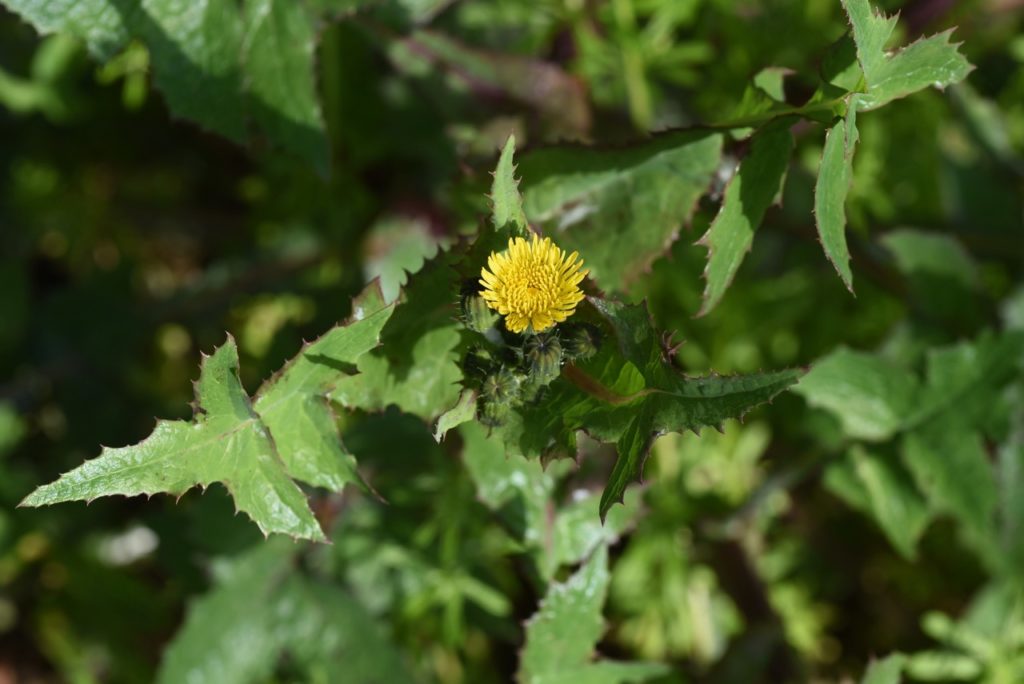
- BOTANICAL NAME: sonchus oleraceus
- HARDINESS RATING: H7
- PLANT TYPE: biennial
- FOLIAGE TYPE: deciduous
- FLOWERS: yellow
- FLOWERING SEASON(S): summer
Another weed, I know, but sow thistle is actually really useful to have growing in your vegetable patches near your onions for a couple of reasons – and will not usually become too much of a nuisance.
Not only does it add nutrients to the soil it grows in like bacon weed, but this edible weed can also be harvested and used as a natural mulch, or, as it is commonly referred: ‘chopped and dropped’ onto the ground around your plants.
So, before getting rid of these weeds entirely, consider how they could benefit your onions, whether that’s in the ground or as chopped-up mulch.
21) Chamomile
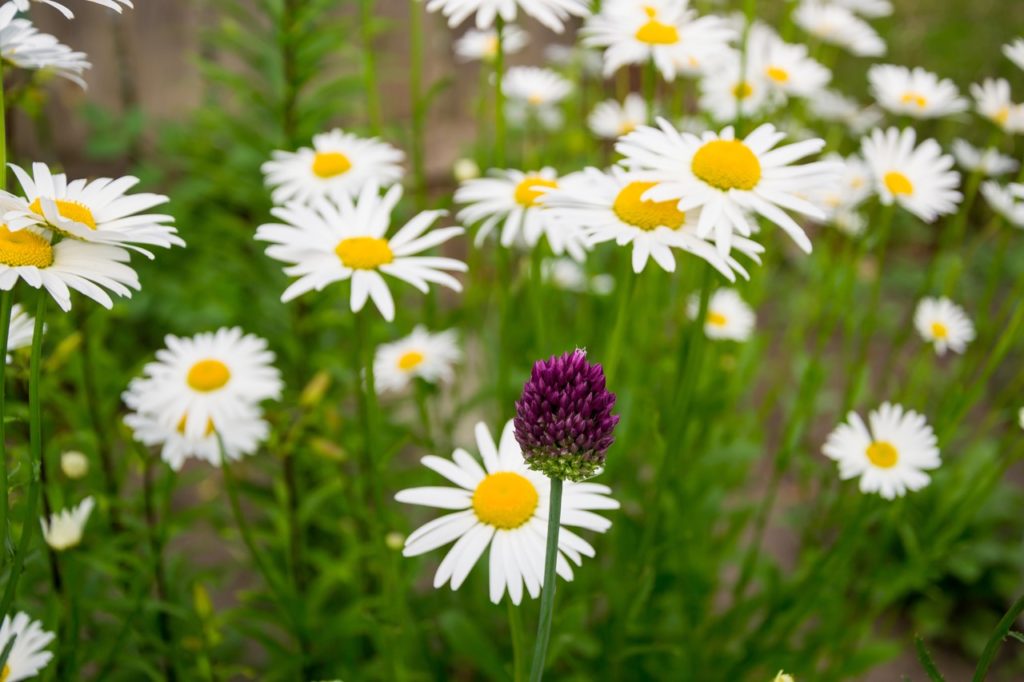
- BOTANICAL NAME: chamaemelum nobile
- HARDINESS RATING: H7
- PLANT TYPE: herb / perennial
- FOLIAGE TYPE: deciduous
- FLOWERS: yellow and white
- FLOWERING SEASON(S): summer
With daisy-like flowers and a small, compact size reaching no more than 50cm in height and spread, you might be shocked to learn that this little herb can actually do a lot for your onions and other vegetables.
Chamomile’s anti-fungal properties help to prevent lots of vegetables from developing fungal issues such as root rot, rust and mildew, so keeping your onions close to this perennial herb is definitely a good idea.7Chamomile – an overview. (n.d.). Science Direct. https://doi.org/10.1016/B978-0-323-85542-6.00003-2
It’s also great at repelling some common pests, so planting onions and chamomile around other vegetables in this list can really help protect them from aphids, flies and mealybugs alike.
22) Potato
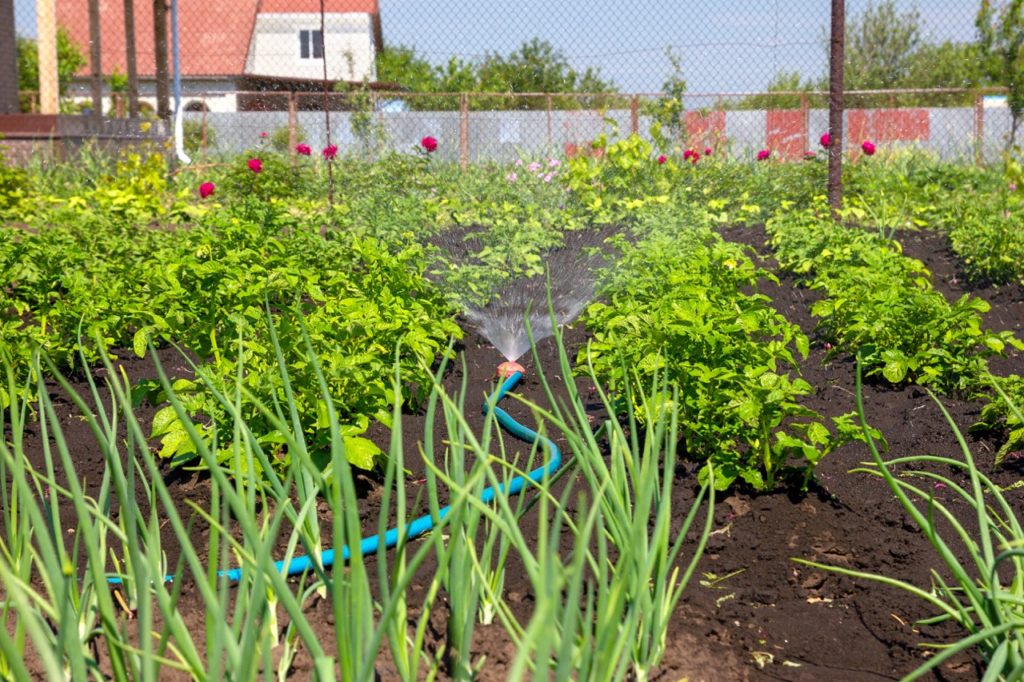
- BOTANICAL NAME: solanum tuberosum
- HARDINESS RATING: H2
- PLANT TYPE: vegetable
- FOLIAGE TYPE: deciduous
- FLOWERS: purple and white
- FLOWERING SEASON(S): spring / summer
Potatoes are a kitchen staple and make a great addition to any home grower’s garden.
Growing them next to onions is a great way to produce as big a yield as possible, as alliums don’t take up much space and won’t harm your potatoes in any way.
However, they do not like too much sun, so make sure they are placed in a shaded location or near tall crops that will protect them from the sun’s rays.
“Onions and potatoes are quite hungry plants, so you don’t want too much competition with those two,” warns Gerald Stratford, Vegetable Expert.
23) Mountain Chrysanthemum
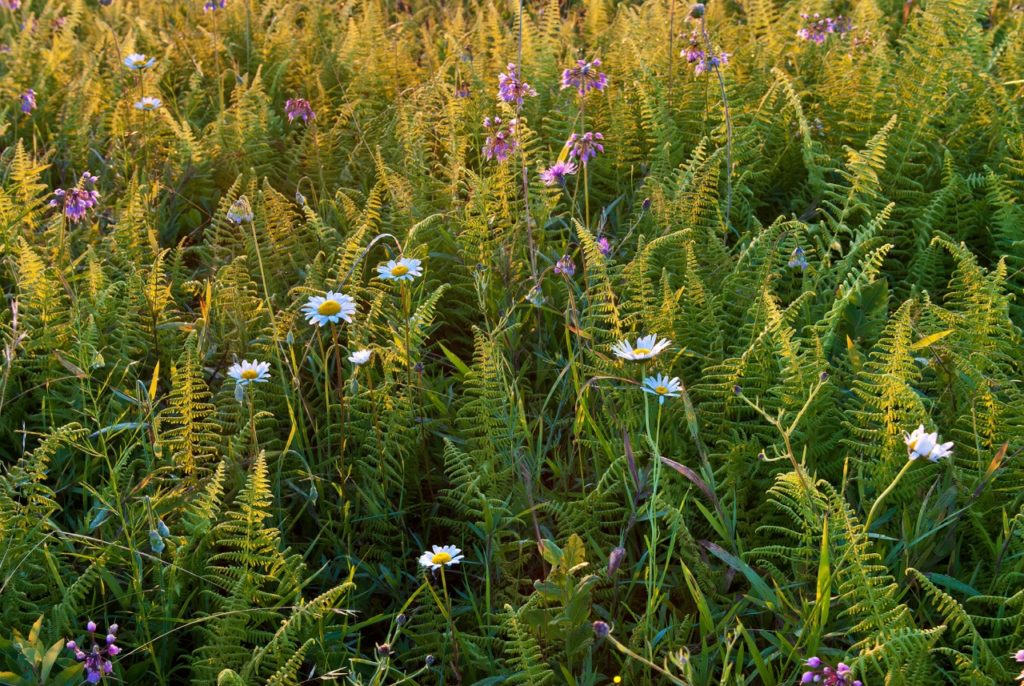
- BOTANICAL NAME: leucanthemum graminifolium
- HARDINESS RATING: H6
- PLANT TYPE: perennial
- FOLIAGE TYPE: deciduous
- FLOWERS: white
- FLOWERING SEASON(S): summer
The final flower to appear on this list, the mountain chrysanthemum is a daisy-like variety that benefits from onion’s ability to deter aphids with its scent.
All chrysanthemums are great pollinators and will reward your onion crops with lots of bees and butterflies that should speed up pollination and help the wildlife in your garden thrive.
24) Parsnip

- BOTANICAL NAME: pastinaca sativa
- HARDINESS RATING: H5
- PLANT TYPE: vegetables
- FOLIAGE TYPE: deciduous
A delicious vegetable that will pair nicely with your onions when growing in the ground and in the kitchen, parsnips are hardy plants that grow best in similar conditions to onions and the other veggies on this list.
Like carrots, parsnips can often be damaged by carrot flies, so planting them near onions will help to keep them protected from these pests.
Parsnips prefer acidic to neutral soil, so make sure the spot you choose to grow them in is not alkaline and you will be rewarded with yummy yields.
25) Ornamental Cabbage

- BOTANICAL NAME: brassica oleracea
- HARDINESS RATING: H7
- PLANT TYPE: perennial / vegetable
- FOLIAGE TYPE: evergreen
- FLOWERS: yellow
- FLOWERING SEASON(S): summer / autumn
- FRUIT SEASON(S): autumn
Most brassicas come from ornamental cabbage, so this delicious vegetable is definitely one you should consider for your vegetable garden.
Unfortunately, like the other brassicas on this list, this plant is susceptible to pest damage and will enjoy the luxury of being planted next to pungent onions that will help to deter them.
Cabbage is a low-maintenance veggie and will be easy to care for once established.
References
- 1Onion Maggot. (2016, October). Center for Agriculture, Food, and the Environment. Retrieved March 21, 2023, from https://ag.umass.edu/vegetable/fact-sheets/onion-maggot
- 2Garlic Guide. (n.d.). An Herb Society of America Guide. Retrieved March 21, 2023, from https://www.herbsociety.org/file_download/inline/f751abad-cc5c-414f-89a5-b9e6b012ea70
- 3Cornish, R. (2022, September 20). Dill: Everything you need to know. Good Food. Retrieved March 21, 2023, from https://www.smh.com.au/goodfood/everything-you-wanted-to-know-about-dill-20220908-h268tf.html
- 4Tirrell, R. (1971, March 7). Summer Savory. The New York Times. Retrieved March 21, 2023, from https://Cornish, R. (2022, September 20). Dill: Everything you need to know. Good Food. Retrieved March 21, 2023, from https://www.smh.com.au/goodfood/everything-you-wanted-to-know-about-dill-20220908-h268tf.html
- 5Blue, N. (2023, January 30). What Is Savory: All About the Savory Herb and 4 Related Recipes. Recipes.net. Retrieved March 21, 2023, from https://recipes.net/articles/what-is-savory-herb-and-related-recipes/
- 6Kale. (2021, October 19). The Nutrition Source. Retrieved March 21, 2023, from https://www.hsph.harvard.edu/nutritionsource/food-features/kale/
- 7Chamomile – an overview. (n.d.). Science Direct. https://doi.org/10.1016/B978-0-323-85542-6.00003-2

